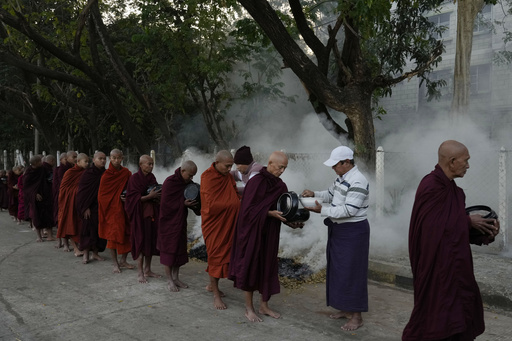BANGKOK — The outlook for peace in Myanmar appears increasingly grim, with civil conflict continuing to escalate four years after the military wrested control from an elected government. Despite mounting international calls for a resolution, the political climate remains fraught, void of any meaningful dialogue between the military regime and major opposition forces opposing its rule.
According to the U.N. Development Program, the aftermath of the military coup on February 1, 2021, has plunged half the country into poverty, exacerbating an already troubled economy. The U.N. Human Rights Office reported a disturbing rise in violence against civilians last year, marking the highest civilian casualty rate since the military seized power. This increase in brutality has coincided with the military’s deteriorating control over the nation.
The army has conducted relentless airstrikes and artillery bombardments targeting civilian areas, forcibly conscripting thousands of young individuals, and executing arbitrary detentions. Many citizens have also been displaced, while humanitarian access has been severely restricted, even during times of natural disasters, the rights office stated in a recent update.
U.N. human rights chief Volker Türk expressed deep concern over the worsening situation, noting that civilian hardships are intensifying despite the diminishing authority of the military. He highlighted that the retaliatory attacks carry the intention of subduing and terrorizing the populace.
A collective statement from the United States, United Kingdom, European Union, and other nations condemned the military takeover and urged the release of the ousted leader Aung San Suu Kyi, along with other political detainees. They observed that around 20 million individuals require humanitarian assistance, with approximately 3.5 million internally displaced—a figure that has surged by nearly a million over the past year. Increased organized crime, including drug trafficking and scams, has also become a regional concern, threatening stability in neighboring countries.
The military’s takeover ignited widespread demonstrations, which were met with brutal crackdowns, ultimately leading to armed resistance and the current civil war. Ethnic militias and pro-democracy forces have gained control over significant areas, while the military retains authority in central regions and major urban centers like Naypyidaw.
The Assistance Association for Political Prisoners, which tracks repression under the military regime, reports at least 6,239 fatalities and over 28,444 arrests since the power transition. The actual death toll is believed to be substantially higher, as the organization typically does not include casualties from the military side and faces challenges in verifying incidents in remote locales.
Aung Thu Nyein from the Institute for Strategy and Policy-Myanmar remarked that the country’s current state is at a nadir, with peace and development taking a backseat. He noted the potential erosion of national sovereignty, suggesting that the nation’s borders could shift as the situation continues to unfold.
Over the past year, Myanmar’s military has encountered unparalleled setbacks on the battlefield. A coalition of ethnic armed groups has secured key victories near the Chinese border and in Rakhine state, capturing military installations and diminishing the army’s control in other regions.
Historically, ethnic minorities have sought greater autonomy from the central government, aligning themselves with the People’s Defense Force, which emerged following the military coup. Concurrent reports from the U.N. Human Rights Office and Amnesty International have also highlighted human rights violations by some of these armed groups.
In an attempt to navigate a political resolution, the military regime has announced plans for elections, which it asserts will occur this year. Critics, however, argue that these elections cannot be considered legitimate, given current restrictions on civil liberties and the incarceration of key opposition figures. This electoral effort is viewed as merely a strategy to legitimize military rule.
The military government extended a state of emergency for an additional six months, claiming that more time is essential to ensure stability ahead of the elections. MRTV, the state-run television, noted that no specific election date has been established.
Tom Andrews, a U.N. human rights rapporteur, articulated that conducting a credible election under the current conditions—characterized by the arrest and torture of opposition leaders, alongside suppression of free speech—was impossible. He urged the international community to recognize these electoral plans for what they truly are – a deceptive facade intended to maintain military dominance.



